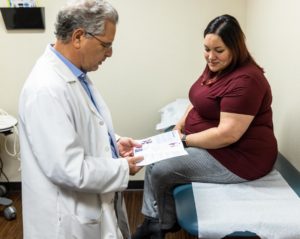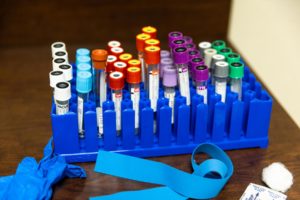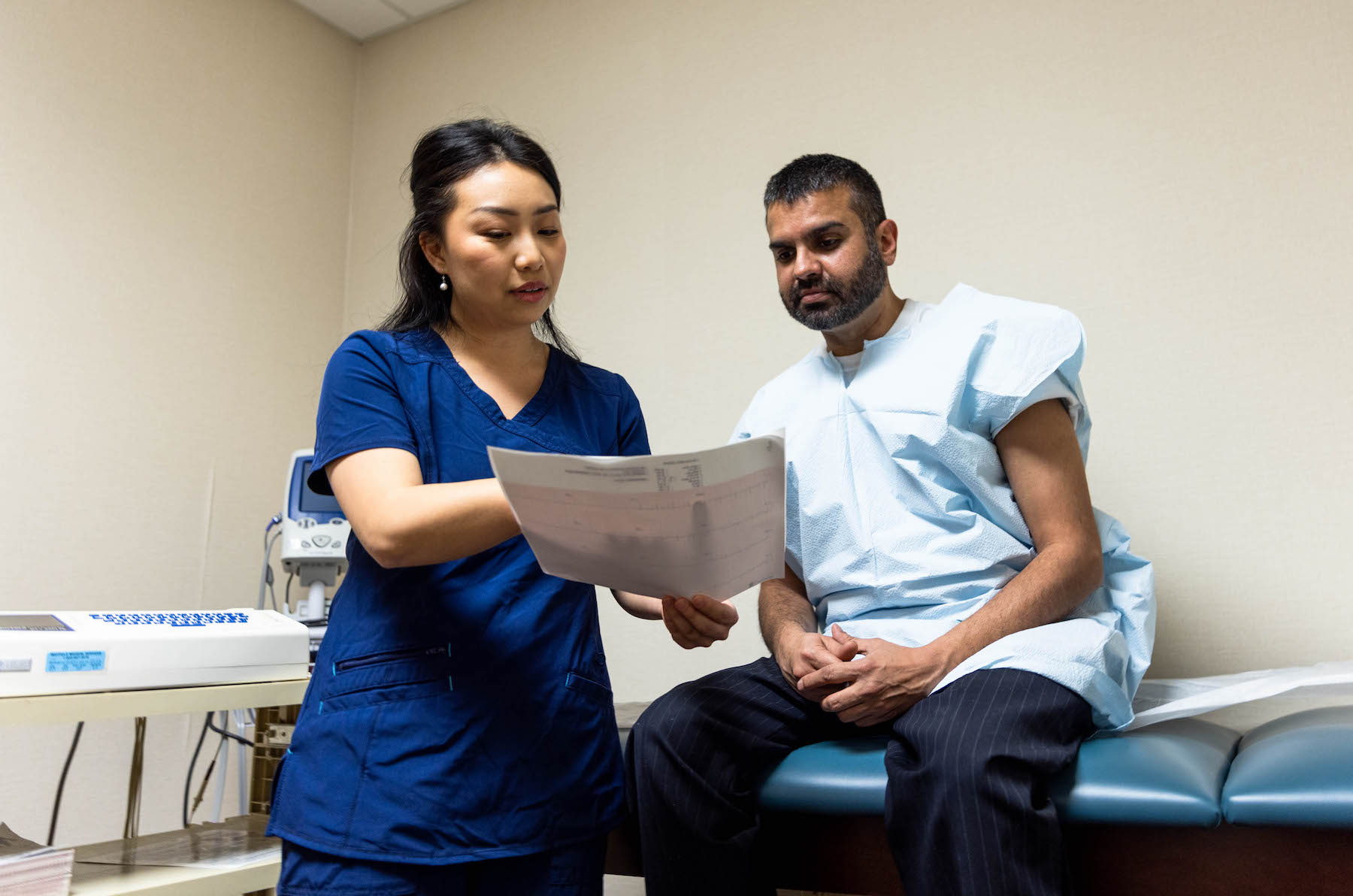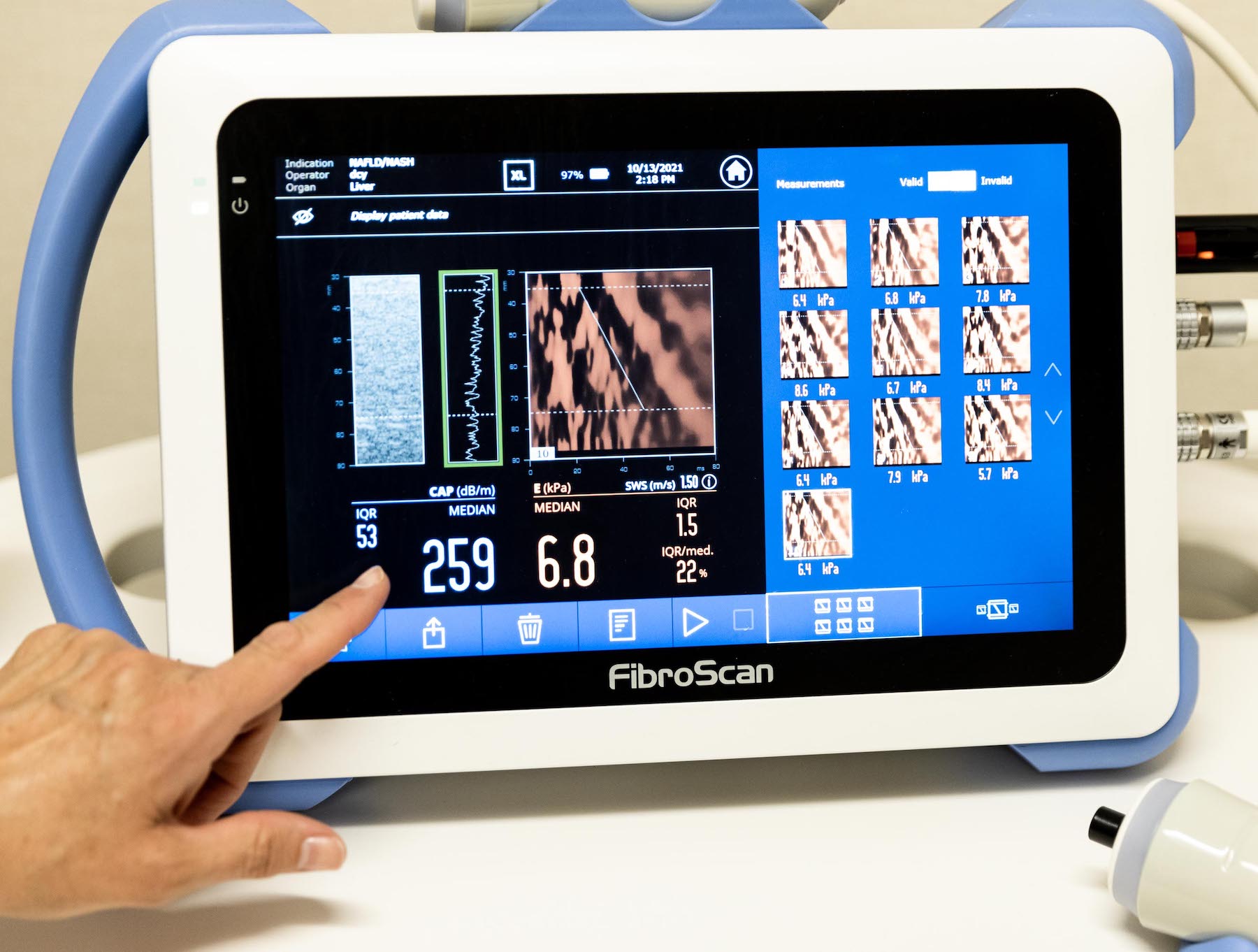Fatty liver disease (FLD) refers to complications that arise from an excess of fat stored in the liver. According to data from the Mayo Clinic, nonalcoholic fatty liver disease affects about one quarter of the population in the U.S. There are no FDA approved treatments for FLD, and it can progress quickly into more serious issues like end stage liver disease or cirrhosis in 25% of patients, even though it presents with no symptoms at all. Clinical trials are often FLD patients’ best and only opportunity for treatment.
For over 20 years, Kansas City Research Institute has conducted Phase II and Phase III clinical trials for patients in the Kansas City metro and surrounding areas. Transparency, results, and your best opportunities—that is our mission. We will be by your side every step of the process, from beginning to end, to ensure that your experience and results as a fatty liver clinical trial participant are positive.
Dr. Bradley Freilich, the founder of Kansas City Research Institute (KCRI), is a widely published, board certified gastroenterologist and hepatologist. He is passionate about offering resources and positive guidance for liver disease patients through the power of research. With the help of his dedicated team, Dr. Freilich works to bring safe, reliable, and groundbreaking treatment opportunities to fatty liver patients from all over the Kansas City metro.
When you choose to participate in a medical trial with KCRI, you know that you are receiving the safest and most effective experimental drugs and procedures available. Just like we screen patients for candidacy, we screen trials for reliability and effectiveness. We only choose to participate in trials with proven safety, minimal side effects and proven success.
Continue reading to feel better prepared to participate in a fatty liver clinical trial near you at KCRI.
Joining a fatty liver clinical trial
Applying for a clinical trial is a major medical decision that can have lasting impacts on your health. If you are a fatty liver disease patient and aren’t sure where to turn, KCRI can guide you through the process and help you access leading medical research.
If you are looking to join a fatty liver clinical trial, there are multiple ways to begin your journey.
- Use the current research page on our website to stay informed about trials we are currently enrolling for
- Fill out an online application or request a call to speak to one of our researchers
- Get a referral from a primary care physician based on your medical history
Our Clinical Trial Screening Process
Screening for medical trial applicants in Kansas City happens on a consultative basis. All applicants will speak to one of our KCRI research team members to go over your history, symptoms, and experience with fatty liver disease to determine if you are an ideal candidate for a particular study. Determining candidacy is paramount to ensuring the maximum effectiveness for our studies and our patients.
The screening process allows our doctors and nurses to learn more about an individual patient’s experience with fatty liver disease. Because the symptoms can be so mild, or often absent, many people might not even be aware that they are living with FLD at all. It can present generally as fatigue and abdominal pain or acutely as swollen blood vessels and jaundice in more severe cases.
The screening process alone could take anywhere from 4-8 weeks, and clinical trial applicants should be prepared for an extended timeline while being treated. An initial screening appointment is a 2–3-hour session that might include additional scans, testing, and lab results, so it’s best to reserve at least a half day. Although the process can be lengthy, all steps are in place to safeguard patient safety and produce impactful results.

Am I a candidate for a fatty liver clinical trial?
Going through our screening process is how we determine if you’re a candidate for a fatty liver clinical trial. The term inclusion criteria refers to elements of your patient profile that would make you an ideal candidate for a particular study.
Determining if you qualify for a clinical trial may entail a different process and set of criteria depending on the research question, phase of the trial, and protocol used. Fatty liver disease patients looking to participate in a clinical trial should consult one of our research professionals to be screened for a specific study.
Why would I not be accepted into a clinical trial?
Exclusion criteria is a term that refers to elements of your patient profile that might exclude you from a clinical trial.
This criterion could include certain risk factors, comorbidities, or other recent medical history such as:
- HIV
- Cancer
- Type 1 diabetes
- Pregnancy
- Recent gastric surgery
- Drug and alcohol abuse
It’s important that you speak with a researcher or medical professional about your candidacy for current or future medical trials.
That said, clinical research and medical advancements are always evolving. For applicants who are not a candidate right now, future clinical trials might be better aligned to your patient profile. Filling out a detailed patient history with KCRI will help us consider you for additional opportunities and make further recommendations about your case.
What to know after you’ve been accepted into a clinical trial
All fatty liver clinical trials will differ from one another in their schedule, procedures, screening process, and timeline. Each clinical trial has a unique research question it aims to answer, resulting in an individual protocol, or trial plan.
As you move through the process of applying, screening, and being accepted, our doctors and nurses will keep you informed on next steps and what to expect. In addition to our medical professionals, we have a dedicated team of administrators behind the scenes at KCRI. Below are a few more points of consideration as a trial participant.
Timeline and schedule of clinical trials at KCRI
The unique protocol of each fatty liver clinical trial will outline the number of treatments spaced strategically over a period of time. It will differ but typically treatment appointments are weeks or even months apart. You can be sure that our team of researchers will clarify the timeline and schedule of your clinical trial with you upon your acceptance.
The difference in phase 2 and 3 clinical trials
KCRI patients can rest easy knowing that our medical staff is committed to advancing medicine by facilitating access to promising new treatments.
- Phase I – Screening for the safety of the drug or therapy in a small number of people
- Phase II – Testing the efficacy and safety of the drug or therapy in a larger number of people
- Phase III – Confirming effectiveness, monitor side effects, compare to commonly used treatments, and collect information that will allow the experimental drug or treatment to be used safely on large groups of people. Typically, 1000+ individuals are enrolled in Phase III studies.
All of our fatty liver studies are in Phase II or III of clinical trials, meaning the protocol has already been through at least preliminary testing. The more advanced the phase of a clinical trial, the more reassurance we have in its effectiveness and the easier it is for us to determine who would be an ideal candidate.

What is placebo in a clinical trial?
In every clinical trial, there is the possibility that you could receive a placebo instead of the trial drug. The placebo is an important aspect in any scientific study; it acts as a baseline that researchers can measure against when trying to determine the safety and effectiveness of a new treatment.
Do not let the possibility of receiving a placebo deter you from participating in a fatty liver medical trial. There is no FDA approved cure for fatty liver disease and a medical trial may be your only opportunity for effective treatment. Simply just participating in a trial increases your chances of receiving an active investigative medication by 3 times. Remember, if you are taking nothing for fatty liver disease, you are effectively on placebo now.
Also remember that participation in one fatty liver clinical trial may not exclude you from others. We will always keep our patients informed of opportunities to participate in studies that could offer long-term solutions.
Continued care during and after the trial
While we will not take over any of your outside medications or treatments from other healthcare providers, we are happy to communicate and coordinate with other physicians or specialists when necessary. We recommend that you continue to see your primary care physician during and after the trial to ensure that your care is as safe and effective as possible for both your short and long-term health. Your primary care provider should also know that we will not remove their care from your health plan.
Frequently Asked Questions: Fatty Liver Clinical Trials
How safe are clinical trials at Kansas City Research Institute?
Our trusted team of medical professionals is passionate about helping our patients by connecting them with impactful research opportunities. We believe in transparency, dedication, and results for every KCRI clinical trial participant.
Kansas City Research Institute is highly selective with the clinical trials we choose to participate in. Just like we screen applicants for candidacy, we screen trials for safety and effectiveness. When it comes to fatty liver disease, this means we only select studies in Phase II or III, so the protocol has already been through the preliminary testing involved in Phase I.
What are the side effects of a fatty liver clinical trial?
Side effects in a clinical trial are never concrete. Because trials are research endeavors, potential side effects are often similar to symptoms of the diseases or illnesses the study is aiming to treat, but not always. Treatment protocols can also affect individual participants differently. However, most of our trial agents have minimal to no appreciable side effects.
Before and during your participation in a fatty liver clinical trial near you, we will ensure you are fully informed of what to expect, including potential known side effects.
Will a fatty liver clinical trial help me lose weight?
While some participants may experience weight loss during a fatty liver trial, it is not always a treatment goal. We design our protocols to aid the body in mitigating liver damage that might lead to disease progression or more serious symptoms like steatohepatitis or cirrhosis. As the liver becomes healthier and sheds excess fat deposited, weight loss may occur naturally.
How much time should I expect to commit to a fatty liver clinical trial?
All trials occur as outpatient care. Patients do not stay at our facilities. Every clinical trial will require a different number of treatments spaced out strategically over weeks or months.
A protocol is the plan we use to conduct the trial. During the screening process and upon your acceptance into a clinical trial, it’s important to discuss the protocol with the doctor, nurse, or other medical professional conducting the study. We design every protocol with patients in mind. Each one includes a unique treatment timeline.
Will I get paid to be a part of a clinical trial at KCRI?
Depending on the type and funding available for the individual trial, it is possible that we may compensate participants throughout their treatment. The payment amount and frequency will vary with every unique trial. All applicants should know that candidacy is our first priority when selecting participants.
As trial facilitators, we always provide patients with the best opportunity to manage and alleviate symptoms of fatty liver disease and contribute to their long-term health. For more inquiries about funding for clinical trials, or where compensation comes from, look to our FAQs page.
Contact Kansas City Research Institute to participate in fatty liver clinical trials near you
While there is no cure for fatty liver disease, professionals at KCRI are dedicated to helping our patients manage and improve their symptoms with leading clinical research.
If you believe you might be a candidate for a fatty liver clinical trial near you, contact Kansas City Research Institute today to speak to a medical professional.



